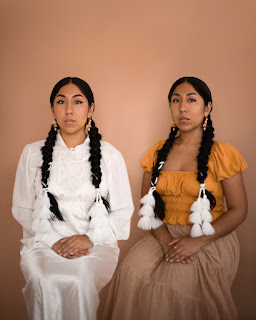As most artists in the DMV know by now, the Phillips Collection’s call for area artists to submit artwork for Inside Outside, Upside Down, a juried invitational show (currently on view through September 12), where the museum invited artists of the Greater Washington area to submit recent artwork that “addresses the unprecedented events of the past year” was and is the talk of the visual arts community for the last few weeks.
The call was part of the museum’s 100th anniversary celebration, and according to the Phillips' news release continues “founder Duncan Phillips‘s commitment to present, acquire, and promote the work of local artists.”
About 1,300 works of art ranging from paintings, to sculptures, videos, drawings, etc. were submitted for review, and about seventy works were chosen by the jurors, Elsa Smithgall (Senior Curator, The Phillips Collection), Renée Stout (DC artist and guest curator of the exhibition), Phil Hutinet (publisher of the local news art source East City Art), and Abigail McEwan (Associate Professor of Latin American Art at the University of Maryland).
I am proud and honored to have been one of the chosen artists – Muchas thank yous to the jurors!
Several of the DMV area blue chip artists were selected, including megablue chip artists like Tim Tate, Michael Janis, Kate Kretz, Judith Peck, and others – all with immense artistic pedigree, huge exhibition histories and a proven and deep international presence.
A lot of new artists – at least new to me – were also chosen, which is always a great sign of a well-curated exhibition; kudos to the jurors for the internal mental amplitude to select work based on visual impression rather than recognizing a name or presence.
What caught my eye - other than the many great works in the show, was this:
“After an extraordinarily difficult year that has shaken the world, we feel it is important to join with our entire region to celebrate human resiliency, and especially the strength of artists and the arts,” said Vradenburg Director and CEO Dorothy Kosinski. “Duncan Phillips hosted this type of exhibition annually from 1935 to 1950, and we are proud to continue this tradition to support our talented community.”
Shall I repeat that?
“Duncan Phillips hosted this type of exhibition annually from 1935 to 1950, and we are proud to continue this tradition to support our talented community.”
Wait... whaaaat?
Why did the Phillips stop? OK - I don't care --- what I do care about and what I hope the Phillips will do, is to re-start that initiative so that Inside Outside, Upside Down, is not a 2021 anomaly, but the first of annual local area shows like Duncan Phillips organized for 15 years!
The ball is on your court Phillips!
The showcased artists below - and see the digital catalog of the show here.
Cathy Abramson
Simone Agoussoye
Maremi Andreozzi
Carol Antezana
Desmond Beach
Julia Bloom
Michael Booker
Kimberly Brammer
Nikki Brugnoli
Florencio Campello a.k.a. Lenny
Carlos Carmonamedina
Sandra Chen Weinstein
Peter Cizmadia
Wesley Clark
Dominick Cocozza
Robin Croft
Sora DeVore
Sarah Dolan
Mike Dowley
Nekisha Durrett
Tae Edell
Bria Edwards
Kate Fleming
Chawky Frenn
Amelia Hankin
Michael Hantman
Leslie Holt
Michael Janis
Jane Kell
Jean Jinho Kim
Katherine Knight
Ara Koh
Kokayi
Gary Kret
Kate Kretz
Catherine Levinson
Kirsty Little
Kim Llerena
Aaron Maier-Carretero
Timothy Makepeace
David Mordini
Barbara Muth
Werllayne Nunes
Zsudayka Nzinga
Jennifer O’Connell
John Pan
Judith Peck
Shedrick Pelt
Kristina Penhoet
Marta Pérez García
Lydia Peters
Junko Pinkowski
Dominick Rabrun
Mojdeh Rezaeipour
Marie Ringwald
Janathel Shaw
Joseph Shetler
Nicolas F. Shi
Tim Tate
Julio Valdez
Jessica Valoris
Ian White
Richard L. Williams Jr.
Colin Winterbottom




























